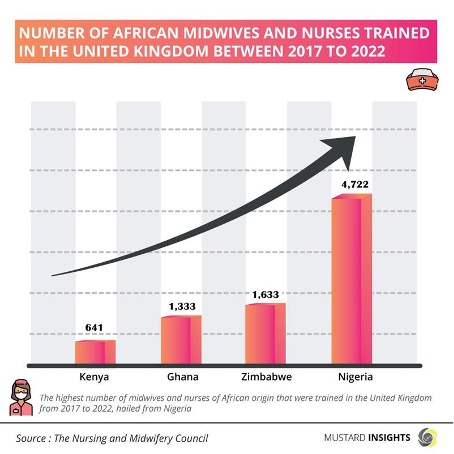Africa Continues to Lose Healthcare Staff to Europe More As Nurses and Midwives Emigrate
Over time we have seen little to no investments go into the development and training of nurses and midwives, who are often overworked and poorly compensated. As a result, nurses have sought opportunities elsewhere. Data from the Nursing and Midwifery Council shows that 8,329 African-born nurses and midwives left the continent to seek better schooling opportunities in the UK between 2017 and 2022.

Healthcare thrives on the backs of nurses. They play a critical role in health promotion, disease prevention, and delivering primary and community care to the public. They provide care in emergency settings and are key players in achieving universal health coverage. No healthcare system can survive without nurses. However, African countries are presently facing a shortage of healthcare workers, particularly nurses and midwives.
Over time we have seen little to no investments go into the development and training of nurses and midwives, who are often overworked and poorly compensated. As a result, nurses have sought opportunities elsewhere. Data from the Nursing and Midwifery Council shows that 8,329 African-born nurses and midwives left the continent to seek better schooling opportunities in the UK between 2017 and 2022.
This unavailability of nurses to cater to the population has put a strain on the quality of care that is administered at the different healthcare facilities in the continent. Few countries are able to spend the $34 to $40 a year per person that the World Health Organization considers the minimum for basic health care.
A breakdown of the data released by the Nursing and Midwifery Council shows that between 2017 and 2022, 4,722 Nigerian-born nurses and midwives were trained in the UK. Other countries with high emigration in the sector include Zimbabwe (1,633), Ghana (1,333), and Kenya (641).
Experienced nurses and midwives are also leaving the continent in numbers. According to data from the register of the Nursing and Midwifery Council (NMC) of the UK, the number of Nigeria-trained nurses rose year-on-year by 68.4 percent in March 2022 from 4,310 in the same month of last year. These are fully-fledged professional and experienced nurses who have chosen to go practice outside the country. Nigeria also ranks third in terms of country of training outside the European Union/European Economic Area. With the level of training received in schools of nursing and midwifery across the nation paired with the high levels of emigration, the country is reduced to bolstering foreign countries’ healthcare workforces. This is undoubtedly the case in other African countries.
Takeaway
Our healthcare systems will crumble in the absence of nurses, as they are invaluable in everything from emergencies to surgeries. Child and parent mortality rates may rise in the absence of well-trained and experienced midwives. African governments must invest more in the nursing sector, both in training and wage compensation, to stop more quality nurses from leaving the continent to seek better opportunities abroad.
Thoughts?
We won't share your email address. All fields are required.
